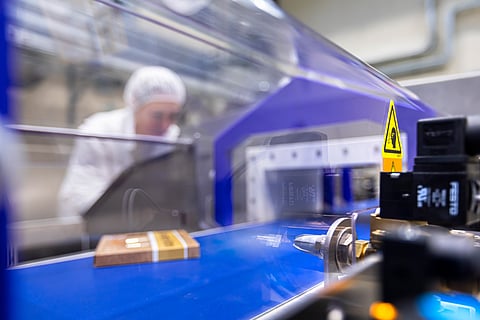
- Home
- EventsEvents
- Product Launches
- CategoriesCategories
- Advertise
- Opinion

Take a moment and imagine a world where every single food product is free from harmful foreign body contaminants or quality errors. This is a world where consumers never experience issues with their end products and manufacturers and brands never worry about their business reputations or, worse, legal action.
Sounds perfect, right? This utopia doesn’t have to be so far off. With the right steps and with advanced product inspection solutions, manufacturers can go a long way in producing high quality and safe goods.
Here’s the twist. It does not – and should not – stop there. Whether it's detecting foreign body contaminants, verifying weights, inspecting labels or assessing product integrity, the reliability of the inspection process is crucial.
So…one big question remains. Who watches the watcher? This article examine the principles of due diligence in relation to product inspection, focusing on critical control points and the necessary measures to deliver reliable and accurate inspections.
Due diligence
In the quest for maintaining trust and brand reputation, that question – "who watches the watcher?" becomes paramount. For manufacturers, due diligence holds the key to safeguarding from potential disasters. With the presence of social media and online reviews, a single food safety incident can swiftly spiral out of control, wreaking havoc on a brand's image.
To protect their businesses, manufacturers must transcend traditional methods of due diligence and embrace technology as their ally. The essence of due diligence in manufacturing lies in implementing comprehensive quality control practices. These measures help ensure that products are safe, accurately labelled and free from foreign body contaminants.
However, even with the best intentions, non-deliberate breaches in food safety can occur due to various reasons. Factors such as the manufacturing environment, processing methods, production line equipment and even human operators can contribute to such incidents. Additionally, intentional acts of sabotage have also led to product recalls, adding to the complexity of the challenge.
In the face of a potential product recall, manufacturers must demonstrate the highest level of product quality and the appropriate steps taken to minimise the risk of litigation, customer complaints and further recalls. This is where advanced technology comes into play, revolutionising the landscape of product inspection and due diligence.
The technology
Within product inspection, several smart technological advancements shine as beacons of maintaining impeccable standards of product quality and safety whilst boosting productivity. Advanced metal detection technology serves as a critical tool in identifying ferrous and non-ferrous metal, and stainless-steel contaminants that could pose significant risks to consumers. Smart x-ray inspection empowers manufacturers to detect a wider range of foreign bodies plus simultaneously completing a variety of product integrity checks. Automated vision inspection systems act as vigilant guardians, meticulously examining product quality through visual analysis, detecting label defects and inconsistencies in the content on the label that might have eluded human eyes. Meanwhile, high-performing, precision checkweighers play a pivotal role in verifying product weight compliance, averting instances of under-fills or over-fills that could compromise consumer satisfaction or regulatory adherence.
The due diligence of the machines
While the product inspection machines themselves are designed for accuracy, their due diligence relies on certain security factors. A number of features can be integrated into product inspection solutions to provide a series of checks that confirm that the systems are operating correctly at all times for example reject confirmation unit, reject check sensors etc. Password-controlled reject bins provide an added layer of security, preventing unauthorised access and maintaining the integrity of the inspection process. Regular calibration and maintenance help ensure that machines remain accurate and reliable over time, minimising the risk of false rejects or missed defects. Training and competency programmes for operators are crucial to effectively utilise the machines, maximising their potential and avoiding human errors.
Product inspection technologies can also be connected to data monitoring software to complete real-time monitoring of inspection results. This allows manufacturers to identify trends, detect anomalies and take corrective actions promptly.
The due diligence defence
Due diligence in product inspection serves as a robust defence mechanism, protecting consumers and preserving brand reputation. Compliance with industry regulations and standards is a fundamental aspect of due diligence, making sure that products meet the required safety and quality benchmarks. Maintaining traceability and documentation throughout the inspection process allows manufacturers to demonstrate compliance and facilitate recalls or investigations if necessary. By adopting risk mitigation strategies, such as implementing multiple inspection technologies and establishing comprehensive quality control processes, manufacturers can minimise the potential for errors and hazards. Continuous improvement is equally important, as manufacturers should embrace feedback, invest in research and development and continuously enhance their inspection systems and processes to stay ahead of emerging challenges.
The principles of due diligence in product inspection are paramount to safeguarding consumers and protecting brand integrity. As the watchful eye over the manufacturing process, due diligence confirms that products meet stringent safety and quality standards. By embracing cutting-edge technologies, manufacturers can proactively mitigate risks and safeguard their brands. They empower themselves to effectively watch the watcher, ensuring that due diligence is upheld throughout the entire production process, and that we are all one step closer to that utopic world of safe products, happy consumers and perfect brand reputations.
By Rob Rogers, senior advisor Food Safety & Regulation, Mettler-Toledo Product Inspection
Click HERE to subscribe to our FREE Weekly Newsletter
